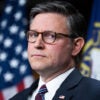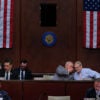Education Secretary Arne Duncan’s comments last week, in which he equated state lawmakers who question the Common Core national standards push with conspiracy theorists, are another indication that the Common Core Initiative is not the states-based movement the Administration claims it to be.
Indeed, national standards have become the cornerstone of the Department of Education’s efforts to increase federal control over the content taught in local schools. As the Pioneer Institute has recently reported, national standards adoption will cost states nearly $16 billion—an amount far exceeding any grant money doled out to states (partly in return for adoption of these standards).
Pioneer also notes that the U.S. Department of Education is running afoul of three laws prohibiting the federal government from being involved n curriculum. And notably, groups across a wide spectrum have voiced concerns that national standards will not improve educational outcomes.
National standards will also require new student assessments. The implementation of these new standards and assessments, the resources necessary to administer the assessments, and the professional development required will come at a hefty cost to taxpayers.
This year alone, South Dakota is spending $8.4 million in professional development training in preparation for implementing national standards in its schools. This training is necessary as teachers and administrators must become familiar with new terminology, new requirements, a new test, and a new system for administering the test, all changes associated with the implementation of national standards.
For this and many other reasons, teachers have some serious concerns about the use of Common Core national standards in their schools. Kasey Brzycki, a fifth-grade teacher in Missouri, worries about the loss of control she’ll have as both a teacher and as a parent. She explains in the video below:
There’s such a disconnect between Washington, D.C. and our schools at the local level. And it’s very sad for me to think that any ounce of local control that we had left…is getter even farther removed, to where, as a parent, if I have a problem with something my child is learning in social studies, I can’t go to the school district, I can’t even go to the state anymore, because it’s out of our hands.”
Danielle Hanson is currently a member of the Young Leaders Program at The Heritage Foundation. For more information on interning at Heritage, please visit: http://www.heritage.org/about/departments/ylp.cfm






























2 Replies to “National Standards: Costly in Dollars and Liberty Lost”